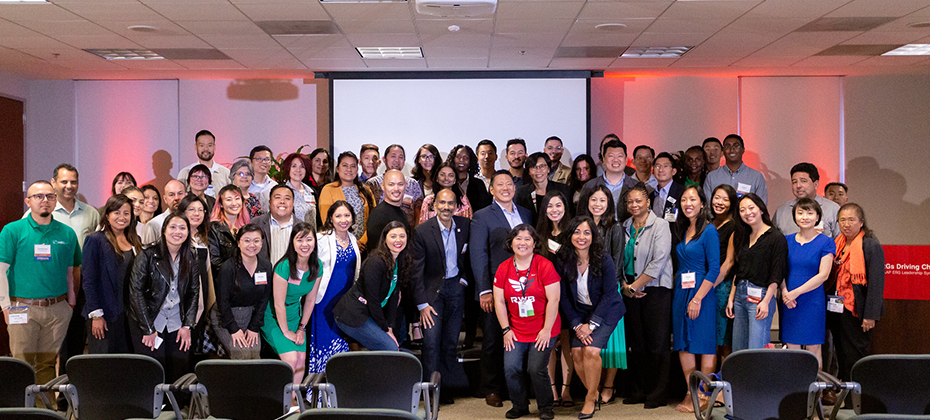Tech & Innovation

At Experian, we are continually innovating and using technology to find solutions to global issues, modernize the financial services industry and increase financial access for all.
DEI

Our deep commitment to social and financial inclusion is reflected in our workplace culture, our partnerships and our efforts to break down the barriers to financial equity.
Financial Health

Our initiatives are dedicated to getting tools, resources and information to underserved communities so that consumers can best understand and improve their financial health.
Latest Posts:

Phishing attacks have become more sophisticated and personal. We are all busy with life – work, family, commute, and dinner plans, along with keeping up on the latest news cycle. Virtually anyone could be inclined to quickly click on a link stating there is an issue with their recent order. But there's more to phishing attacks than just baiting businesses and consumers. During a recent #ExperianLive event, Mike Gross, Head of Global Identity and Fraud Product Innovation, discussed what businesses can do to protect themselves and their customers. Q: You say that phishers would make good digital marketers. What do you mean by that? Mike: Like a great marketer, a good phisher understands people and their tendencies; they know how to get people to take action on their message. Take my most recent “almost phishing" incident. During the holidays, I received an email from a top online retailer stating there was a “problem with my recent order." I knew that any delay would jeopardize my holiday gift delivery. I was just about to click the “Login" button and then stopped. Thankfully, I double-checked the sender and it wasn't my favorite shopping site after all – just a really good fake email from a "phishy" sender. Like a digital marketer, phishers understand how to specifically target the things that people care about. This is why phishing attempts focused around the holidays, tax season, natural disasters, and hot news topics are often so successful. Q: Are phishers counting on the relationship and roles people have in an organization? Mike: Yes. That's the whole nature behind one of the biggest phishing attacks over the past several years – business email compromises. As a phisher, I'm sending you an email that looks like I work with you, say a vendor with a message that reads, “I changed the account that you use to pay me; please update your payment to this new account." If there is urgency behind it, it is taken seriously – for example, to avoid being late on paying a vendor. Human nature is being helpful and reacting, especially in this fast-paced, hyper-connected world – and that's why these scams continue to work. Q: What other phishing trends are you seeing? Mike: They've evolved over time. Take the simple phishing email; it's not so simple anymore. Nowadays, attacks are personalized to both the business and specific person – and phishers are taking advantage of automation and targeting tools so they can get the most reward for their effort. “Smishing" is variant of phishing focused on the phone channel, where attackers target victims with an SMS-based attack; you've probably seen them. You get a text and link from what you think is your friend saying something like “Check out this funny video!" But it isn't legitimate; it's a fraudster that is spoofing your friend's phone number. Then there is “vishing" which is a voice-based attack. This is where a fraudster pretends to be someone they're not (like a consumer's financial institution) and tries to obtain personal information or take over an existing account. Q: Wow! Phishing fraud is sophisticated. What has led to that? Mike: We've seen a tremendous leap in technology used. There is a great example of that last year with a U.K. bank. Their customers expect that if there is an out-of-place transaction, the bank will call them. In this particular vishing scheme, vishers used compromised accountholder usernames and passwords to log into customer accounts and set up money transfers. Knowing that this would alert accountholders to the attempted transfer using the SMS one-time passcode, phishers called legitimate customers, impersonated the bank, and stated that since the customer was a recent fraud attack victim, the bank needed confirmation that they were the accountholder. The vishers told customers they would receive a passcode. While the customer confirmed the code, the vishers submitted the fraudulent transfer. Q: What trends and techniques are you seeing? Mike: Two of the big trends we're seeing is around Artificial Intelligence (AI), machine learning, and SMS to find victims. A big part of phishing is what we call “spear phishing." This targets individuals with access to an organization's financial accounts or internal systems. Another term is “whaling" which targets a specific high-profile individual. The phishers are no longer just sending out blanket lottery scam and Nigerian prince emails with misspellings to millions of people. It's very focused – and phishers can easily do this using machine learning and AI. Q: Do you notice any seasonality, or spikes in phishing based on a certain time of year? Mike: The holidays are one because so many people go to their favorite shopping sites and buy items that are completely out of pattern based on what they usually do online. Another good example is tax season. We saw phishers impersonate top tax and financial management software providers, allowing consumers to “quickly and easily submit their tax forms online." What's worse is that phishers use the knowledge you have about phishing against you. Things like “How do you protect yourself? Click on this link to learn more" or “Click this link to download software and protect your devices." Also, fraudsters pay attention to the news, so whether it's a natural disaster or the cathedral fire that happened in Paris last April, phishers see those as opportunities to prey on victims simply trying to donate to a worthy cause. Q: What advice do you have for businesses and consumers to protect themselves against phishing attacks? Mike: My advice for businesses is to focus on technology and training. Strong technology solutions must be in place at all businesses to block phishing emails that are coming from suspicious sites – and for the most part, large organizations do a great job of that. Smaller businesses can also take advantage of technology solutions from their internet providers. Businesses can implement web blocking software for less secure Internet sites and filter what types of content employees can have access to on business devices. A lot of companies hire outside consultants to talk about the different types of phishing attacks with employees. These are helpful, but the key is to not allow training to become static because attackers evolve so quickly. Both businesses and consumers can use the email filtering option that is available through nearly every email provider. Don't click on any attachments that even remotely look suspicious – especially if they've been texted to you from someone you either don't know or the message appears out of character for someone you know. Q: What activities is your group taking on that will help businesses and their customers fight phishing attacks? Mike: There are several things we're doing that impact businesses and consumers offline and digitally. We help businesses recognize their customers and authenticate them, whether that's helping customers with a new bank account, enabling easy checkout at a favorite retailer app, or protecting account logins. 99% of people trying to access accounts are the legitimate account holder; it's that 1% though that causes a lot of friction for good customers. So, we're trying to make it easier for those consumers to quickly pass through all of the controls so authentication is easier. That translates into consumer loyalty for brands. Q: And that's what it's really all about? Mike: It is. We help businesses recognize their customers and also ensure that they are catching fraudsters on the back end. But we also strive to make that recognition or user experience as seamless as possible, with the right scrutiny for the risk level of that business. Mike Gross leads product innovation strategy for Global Identity and Fraud at Experian. Check out the entire podcast and video on how to protect your business from phishing here.

Across the globe, fraud risks continue to grow and businesses continue to invest more to combat potential threats. According to Experian's 2019 Global Fraud and Identity Report, which was published this past January, more than half of businesses across the world have increased their fraud management budget in the past twelve months. I recently had the opportunity to discuss this very topic with Forbes.com. In the article I raised the issue of whether businesses are investing in the right places. Our research shows that businesses may sometimes be investing in the wrong capabilities or point solutions that are materially less effective than if they were to take a layered approach to fraud detection. To provide consumers with both security and convenient online experiences, companies must have a complete understanding by looking at the problem holistically. By layering multiple approaches such as digital risk assessments leveraging device intelligence, behavioural biometrics together with more traditional measures – businesses can focus their resources where it matters most – providing a safe yet convenient online environment for their customers. The Forbes article also looked at the issue of trust. The anonymous nature of digital interactions makes creating trusted and meaningful relationships with digital consumers difficult. Unlike face-to-face interactions where people rely on visual cues, and relationships developed over time, businesses must find other ways to quickly recognize their customers online and deliver personalized experiences. At Experian, we believe trust is extremely important. In fact, the report found that nearly eighty percent of consumers say the more transparent a business is about the use of their information, the greater trust they have in that business. And fifty-six percent of businesses plan to invest more in transparency-inspired programs such as educating consumers, communicating terms more concisely and helping consumers be in control of their data. There is no doubt about it, businesses who want to continue to thrive and lead in the digital economy will find ways to offer their customers both security and convenience whilst building trust with their audience. Learn more the state of fraud and how trust plays a role by downloading our 2019 report: Consumer trust: Building meaningful relationships online.

We are delighted to announce our investment in bonify, a German fintech start-up dedicated to giving consumers better insights into their creditworthiness. bonify gives its 500,000 customers easy access to their creditworthiness and financial data, offering them a number of financial management tools to help analyse and optimise their financial situation. At Experian, we believe very deeply in the power of data to help improve people’s lives. That’s why we’re so excited by bonify’s continued goal to improve its users’ financial lives, and the steps it is taking to help people in Germany understand and benefit from their financial information. We are delighted to join a number of investors in supporting the growth of this innovative start-up. Charles Butterworth, Managing Director Experian UK, Ireland and EMEA, said: "We are excited by the way bonify is helping people in Germany understand, engage with and improve their credit scores. We look forward to supporting the team as an investor and partner in their future growth.“ Founder and CEO of bonify, Dr. Gamal Moukabary, said: “Experian's investment shows that we are on the right track. It rewards our achievements and our unique value proposition. Experian is an ideal investor and partner for us to support the next growth phase. Our goal is to expand our operations into other European countries.” Manuel Silva Martínez, Partner and Head of Investments, Santander InnoVentures, added: “We are delighted to welcome Experian Ventures to bonify. Experian will add tremendous value and technical expertise to bonify’s product roadmap. We are thrilled to support bonify as we accelerate growth and help more and more people across Germany and Europe with taking control of their finances in a sound and responsible way.

In the United States, June is observed as Pride Month by the Lesbian, Gay, Bisexual, Transgender and Queer (LGTBQ+) community. The celebration is in remembrance of the 1969 Stonewall Uprising in Manhattan, a tipping point for the Gay Liberation Movement in the U.S. Pride is not only about the parades and flags, but about the celebration and commemoration of the contributions members of the LGBTQ+ community have made throughout U.S. history—and there are many. Though the beginnings of Pride Month originate in the U.S., Experian is committed to supporting and uplifting the LGBTQ+ community on a global scale. This year was an especially important year, marking both the 50th anniversary of the Stonewall Uprising and the one year anniversary of the inception of Experian’s Pride Network Employee Resource Group (ERG). Our Pride Network executive co-sponsors, Michele Bodda and Todd Rudie, say, "As our culture continues to evolve, we feel especially empowered by Experian’s demonstrated commitment to diversity and inclusion. With great support from our leadership, we launched the Experian Pride Network just one year ago and have achieved success beyond our aspirations." Earlier this year, for example, Experian earned a "2019 Best Place to Work for LGBTQ Equality" designation by the Human Rights Campaign (HRC). "We are proud to have achieved a perfect score on our very first submission to HRC’s Corporate Equality Index. This was a goal our ERG originally set out to achieve within three years," Bodda and Rudie stated. With so much to commemorate and celebrate, our Pride Network kicked off the month with numerous events around the world, including participation in official Pride parades, on-campus barbecues, bake-offs, spirit days, LGBTQ-focused webinars and so much more. It's important for us to not only provide a safe space for members of the LGBTQ+ community, but to also educate all of our non-LGBTQ employees about how they can be better allies. As part of the festivities, we had The LGBT Center OC conduct a webinar for ways we can develop tools and strategies for good allyship across the LGBTQ+ community and beyond. Here are some takeaways of what it means to be an LGBTQ+ ally: Allies have a deep understanding of LGBTQ+ people, terms, and experiences Allies speak up when they see discriminatory behavior Allies intervene in cases of bullying or harassment Allies always use the right name and pronouns for their transgender friends Allies recognize that they have privilege over other marginalized groups, and they want to use that privilege to help elevate the voices of the unheard Experian also hosted a webinar on navigating the workplace as a transgender individual. While several states have laws in place to protect transgender and gender non-conforming individuals in the workplace, harassment and discrimination are still large issues in the U.S. today. Here are some takeaways of what we can do to better support our transgender and gender non-conforming colleagues and friends: Understand the biases and hardships trans and gender non-conforming individuals face in the workplace — 75 percent of transgender workers experience discrimination, harassment, bullying, privacy invasion and suppression every day at work Know the laws in your state Empathize. You can do this by calling people by the preferred name/pronoun, refraining from making assumptions about others' sexual orientations and avoiding making assumptions that all trans people look the same or are going through a "transition" Be an ally — add gender neutral/all-gender restroom options, normalize the usage of pronouns, don't ask personal or inappropriate questions, etc. After taking measures to further educate ourselves, it was time to celebrate! Here are some photos from our Pride celebrations: Costa Mesa, CA Allen, TX Schaumburg, IL Clearwater, FL Costa Rica

At Experian, we believe that the power of data can be used in everyday life to help consumers worldwide. And we deliver against that mission every day. As the amount of data in the world continues to grow exponentially, the opportunity to harness the power of that information to improve the lives of people around the world grows with it. Experian is uniquely placed to fulfill that mission – we are empowering both individuals and businesses around the globe by putting them in control of their data, and their futures. Our latest Corporate Responsibility Report highlights the very real, tangible impact our company has achieved, enabling more than 20 million people to access credit and other essential services. Through our core products and services – and the introduction of new alternative data sources such as utility and rental data – Experian is adding value to societies around the world, increasing choice, transparency, and competitiveness in economies, and improving financial inclusion, helping those access mainstream financial products, who have previously been unable to. In South Africa, we launched The GeleZAR app. Developed through our social innovation programme, the app uses mobile data to enable unbanked people to improve their credit profile, helping them to access they credit they need to build their businesses and achieve their goals. In Brazil, we’re reaching those living in some of the remote parts of the vast country who don’t have access to our online services. Our Serasa Itinerant truck and boat reached more than 100,000 in 44 countries in its first year, helping consumers to view their credit scores for the very first time and learn how to manage their file, build their history and manage their debts successfully. In the USA, we introduced what we believe is a significant game changer to the way millions manage their finances. Experian Boost allows people, for the very first time, to add positive payment history directly to their file to improve their score. Since launch in March, more than 600,000 customers have boosted their score, taking control of their data in a way that has never been done before. We’re at the forefront of the battle against identity fraud. Our fraud prevention and data capabilities help both clients and consumers keep their data safe. A new service in the USA helps parents protect their children from identity theft and we’re helping older people in the UK to recognise and tackle fraud. Our roots are in providing credit information and assessing lending risks. But we are much more than that. We are creating new opportunities by connecting businesses and consumers in new ways – and exploring how data can be used to tackle societal challenges around the globe. In doing so Experian is supporting businesses grow, people prosper and communities thrive, and helping shape a better tomorrow.

As part of Experian’s commitment to the value of Employee Resource Groups (ERG), we recently hosted the National Association of Asian American Professionals (NAAAP) ERG Leadership Symposium, ERGs Driving Change at our Costa Mesa headquarters. ERGs are a proven strategy for organizations to advance a diverse and inclusive company culture. At Experian, we believe the culture of inclusion also cultivates and advances innovation with the added diversity perspective that strengthens the community of professionals and ideas within the company. We were proud to host the 13th ERG one-day training program that was organized by the NAAAP to help companies and employees advance their ERG experience and learn how ERGs are change agents to enhance productivity and grow professional networks in the corporate setting. Speakers represented companies leading their industry, such as Bank of the West, Macy’s, Anheuser-Busch, Google, Facebook, UPS, Northrop Grumman, Boston Scientific, and many more, including Experian. The symposium this year featured numerous ERG thought leaders sharing their insights across a variety of sessions and panels, including; Best Practices in Demonstrating Value, Creating Connections through ERG Leadership, What’s Next Action Plans for Your ERG, among others. Caption: Hiq Lee, President, Business Information Services for Experian, shared insights as a panelist for The Crucial Executive Role in Driving Change session. She was joined by Judy Ting, SVP, Pacific Rim Region Manager, Bank of the West, and DeAnne Aussem, Managing Director & Founder of U.S. Leadership Coaching Center of Excellence, PricewaterhouseCoopers, LLC. The panel was moderated by Farzana Nayani, NAAAP ERG Architect. All speakers provided valuable takeaways for the professionals in attendance to motivate their organizations to positively impact their company with the diversity amongst its workforce and implement strategies to leverage the power of inclusion. Specifically, the hundred-plus attendees learned more about how Employee Resource Groups and Business Resource Groups are change agents for diversity, inclusion, engagement, productivity, and connection-building within organizational settings. Justin Hastings, former Chief Human Resources Officer for Experian North America, welcomed the ERG Leadership Symposium attendees with his introductory remarks, as he shared Experian’s perspective on inclusion leading to innovation. Therefore, we asked him some questions to share his insights with us on Experian’s ERGs. 1. How is Experian creating a better tomorrow? Hastings: The consumer is at the heart of everything we do. Our product innovation is geared towards giving consumers more control over how their data can enrich their lives. Experian Boost is a perfect example of this coming to life. Inclusion underpins our ability to innovate. The more we encourage a culture where everyone’s creativity is valued, the more we are able to innovate for consumers. Our ERGs play an important role in promoting diversity, and creating an environment where all our Experian people can bring their whole selves to work and be creative. 2. What role does The Power of YOU have in Employee Resource Groups? Hastings: We created a workplace environment where everyone is comfortable bringing their whole self to work, regardless of differences or backgrounds. We call this The Power of YOU, which creates an environment for employees to be their true selves. We advance our company culture by not only respecting the differences amongst Experian colleagues, but actively celebrating them with and through our ERGs. 3. What impact does the Employee Resource Groups have on Experian? Hastings: At Experian, inclusion is vital to the success of the company. Our ERGs provide us with a platform to be a more innovative business. Our ERGs now have around 1,000 employees actively involved across the eight current groups. They have helped create greater understanding of different cultures that are represented in our company, and they have also underpinned our recruiting efforts across diverse talent pools. This has helped us to keep evolving our employee base to be increasingly representative of the communities in which we operate, and the consumers we ultimately serve. Learn more about Experian’s Employee Resource Groups by visiting: https://www.experian.com/corporate/power-of-you.html Learn more about the National Association of Asian American Professionals (NAAAP) by visiting: https://www.naaap.org/ All photos taken by Nhan T. Nguyen.

FY19 proved to be a great year for Experian – one of our best ever. We just announced results, with organic revenue growth of 9%. But that is only part of our story. Behind the company’s success is a strategy that puts consumers first. We have looked to respond to the challenge of financial exclusion around the world, by using data and innovation to bring more people into the mainstream financial system. And we have responded to rapid digitisation of the world by helping organisations of all shapes and sizes to respond and adapt, all through the power of data. Fintech and digital disruption have revolutionised the way people engage with their finances. At Experian we help to speed up applications for credit, check for fraudulent impersonators and improve access to credit at fair and affordable rates. During the course of this financial year, we delivered some major and exciting milestones in our markets: In North America, we launched Experian Boost, an industry-first, game changing offer that is reshaping the credit landscape by putting individuals in control of their credit score. In the UK, we are introducing a range of new innovations, Ascend, Credit 3D and Experian One, which deploy our advanced analytics, predictive data and SaaS-based platforms. We were the first in our industry to be granted approval to supply Open Banking and PSD2 services by the Financial Conduct Authority and we have rolled out new services which help to assess whether loans are affordable. In Asia Pacific, we are building out our data Marketplaces with our strategic investment and partnerships with C88 in Indonesia and Jirnexu in Malaysia. This move will help to increase levels of financial inclusion in the region by improving matching to eligible credit products. In South Africa, we agreed to the acquisition of Compuscan, which will mean we are better positioned to serve the people and businesses of Africa and be an enabler of growth in consumer and business credit, identity management and financial inclusion. To sum up, the financial performance is strong. Our commitment to using data and analytics to help consumers, businesses and society at large is even stronger.

For the past several years, Experian has been on a journey to help drive financial inclusion for millions of people around the world. This has required significant changes in how we operate, who we partner with, and the products and solutions we offer —and with those changes comes a renewed sense of purpose. What we do and the actions we take have the potential to improve lives. We are actively seeking out unresolved problems and creating products and technologies that will help transform the way businesses operate and consumers thrive in today’s society. But we know we can’t do it alone. That’s why over the last year, we have built out an entire team of account executives and other support staff that are fully dedicated to developing and supporting partnerships with leading fintech companies. We’ve made significant strides that will help us pave the way for the next generation of lending, while improving the financial health of more people around the world. Earlier this week, I attended the FinovateSpring conference in San Francisco to speak with fintechs and financial institutions about ways to put financial health at the center of an organization’s plans to build trust, reach new customers and ultimately grow business. We are developing platforms that are designed to play to the strengths of fintechs and disrupt the industry. In the past, we have looked at unresolved problems and asked ‘why?’ Today, with our fintech partners, we look at potential solutions to these unresolved challenges and say, ‘why not.’ As part of our concentration on fintech, Experian has made significant investments in alternative data, such as the game-changing Experian Boost platform, which was launched just two months ago and is already reshaping the way consumers gain access to credit. Since we launched Experian Boost, consumers across America have instantly increased their credit score by sharing their bill payment history for things like utilities, mobile phones and cable TV payments – payments which had never been factored into a credit score before. And, yes, this platform came to fruition as a result of a fintech partnership. We have partnered with fintechs in other powerful ways, too. Our new Ascend Analytical Sandbox – a first-of-its-kind data and analytics platform – gives companies instant access to more than 17 years of depersonalized credit data on more than 220 million U.S. consumers. This creates better opportunities for consumers by allowing our clients to provide more tailored solutions. It’s a great example of the power of analytics and we’re very proud of it. During our time at Finovate, we were able to engage in meaningful conversations with fintech leaders who were united in our goal of helping more consumers access the financial services they need. We’re more inspired than ever before to continue to build and explore strategic partnerships that will ultimately improve the lives of American consumers.

It gives me great pleasure to announce that Experian has won the Consensus Economics Forecast Accuracy Award 2018 for the UK. Our UK Economics Team was recognised for their high-quality research, their commitment to regular forecasts and their ability to identify most accurately the trends and levels of key indicators over the 24-month forecasting cycle. The Forecast Accuracy Award program recognises the achievements of a select group of expert country economic forecasters who have most accurately predicted the performance of GDP growth and Consumer Price Inflation for their targeted economies over a 24-month forecasting cycle. Experian were the most accurate UK forecaster out of pool of 36 organisations. Mohammed Chaudhri, Head of UK Macro Forecasting, said: “We’re thrilled to win this award. We spent a lot of time analysing the UK economy following the referendum vote in 2016 and, at the time, many forecasters were expecting an immediate recession. However, we felt that the UK economy would prove more resilient in the coming years. We are pleased that our forecast for 2018 was so close to the actual development.” The award underlines the wealth of knowledge across the UK Economics Team, with over 30 years of macro-economic forecasting experience to their name. The accuracy of our economic forecasts is a real benefit when understanding how the UK economy will impact businesses in the future. By embedding our forecasts into the decision-making process organisations can embrace the opportunities presented by an ever-changing economics landscape. I’d like to congratulate Mohammed and his team on a well-deserved award win, along with all the other winners from across the globe. To find out more, click here.


